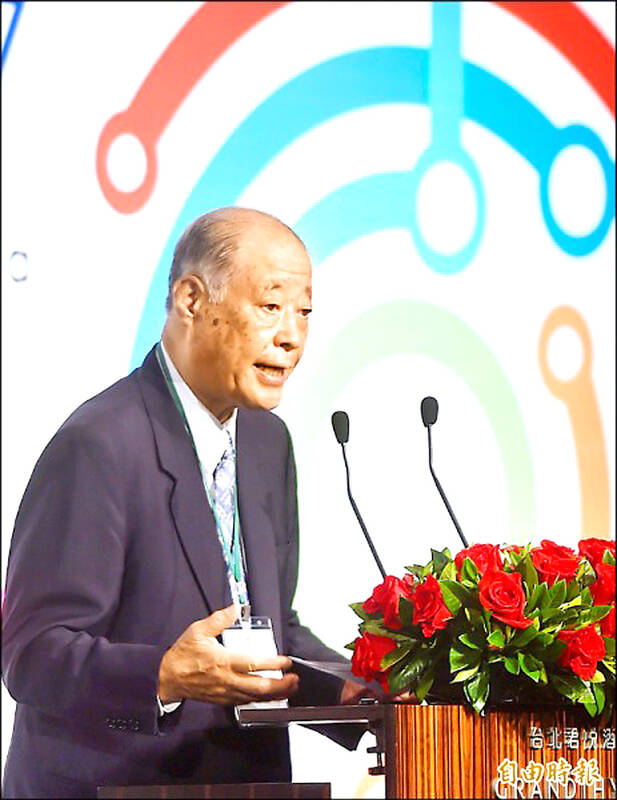China is unlikely to attempt an invasion of Taiwan, as defeat would mean the collapse of the Chinese Communist Party, a former Japanese defense official said on Sunday.
China is also facing food security problems and its military strength remains insufficient for an invasion of Taiwan, Tokuichiro Tamazawa, who formerly served as director-general of the Japan Defense Agency, said during a speech at an event held by the Japan-Taiwan Exchange Association in Taipei.
In a Facebook post, political commentator Akio Yaita quoted 85-year-old Tamazawa as saying that this week’s visit to Taiwan was aimed at “uniting Taiwanese in the face of Chinese projections of strength.”

Photo: Lu Yi-hsuan, Taipei Times
If Taiwanese show determination to defend themselves, democracies worldwide would come to their aid, Tamazawa was quoted as saying.
Tamazawa said that as China imports 5 percent of its food, and since its Belt and Road Initiative has failed to boost its food security as Beijing had hoped, 70 million Chinese face food security problems.
Those food imports are also being threatened by Russia’s invasion of Ukraine, as China previously had obtained 27 percent of its imported grains from the two nations, he said.
The problem is exacerbated by the fact that 60 percent of China’s population eats pork and 1kg of pork requires 30kg of grain to produce, he said, adding that China is also struggling to catch enough fish to meet demand, especially as Chinese fishers are banned from fishing within 200 nautical miles (370km) of Japanese waters.
“Launching a war requires an abundant food supply. If China were to start a war now, it would immediately face food shortages,” Tamazawa said. “You can’t fight a war on an empty stomach.”
He said that the US invasion of Japan in World War II could be used as a reference for how an attempted invasion of Taiwan might unfold.
“The US military had roughly 700,000 troops, 30 aircraft carriers and 300 warships when it initially attempted to take Kyushu, which had a garrison of 200,000 troops,” he said. “Despite its greater numbers, the US was unable to take Kyushu at that time.”
China would need at least 1.3 million to 1.6 million troops to invade Taiwan and it is currently not capable of transporting that number to Taiwan in the timeframe required, he said.
Beijing realizes that an invasion would fail, which is the reason it uses aggressive cognitive warfare tactics against Taiwan, Tamazawa said.

AIR SUPPORT: The Ministry of National Defense thanked the US for the delivery, adding that it was an indicator of the White House’s commitment to the Taiwan Relations Act Deputy Minister of National Defense Po Horng-huei (柏鴻輝) and Representative to the US Alexander Yui on Friday attended a delivery ceremony for the first of Taiwan’s long-awaited 66 F-16C/D Block 70 jets at a Lockheed Martin Corp factory in Greenville, South Carolina. “We are so proud to be the global home of the F-16 and to support Taiwan’s air defense capabilities,” US Representative William Timmons wrote on X, alongside a photograph of Taiwanese and US officials at the event. The F-16C/D Block 70 jets Taiwan ordered have the same capabilities as aircraft that had been upgraded to F-16Vs. The batch of Lockheed Martin

GRIDLOCK: The National Fire Agency’s Special Search and Rescue team is on standby to travel to the countries to help out with the rescue effort A powerful earthquake rocked Myanmar and neighboring Thailand yesterday, killing at least three people in Bangkok and burying dozens when a high-rise building under construction collapsed. Footage shared on social media from Myanmar’s second-largest city showed widespread destruction, raising fears that many were trapped under the rubble or killed. The magnitude 7.7 earthquake, with an epicenter near Mandalay in Myanmar, struck at midday and was followed by a strong magnitude 6.4 aftershock. The extent of death, injury and destruction — especially in Myanmar, which is embroiled in a civil war and where information is tightly controlled at the best of times —

Taiwan was ranked the fourth-safest country in the world with a score of 82.9, trailing only Andorra, the United Arab Emirates and Qatar in Numbeo’s Safety Index by Country report. Taiwan’s score improved by 0.1 points compared with last year’s mid-year report, which had Taiwan fourth with a score of 82.8. However, both scores were lower than in last year’s first review, when Taiwan scored 83.3, and are a long way from when Taiwan was named the second-safest country in the world in 2021, scoring 84.8. Taiwan ranked higher than Singapore in ninth with a score of 77.4 and Japan in 10th with

SECURITY RISK: If there is a conflict between China and Taiwan, ‘there would likely be significant consequences to global economic and security interests,’ it said China remains the top military and cyber threat to the US and continues to make progress on capabilities to seize Taiwan, a report by US intelligence agencies said on Tuesday. The report provides an overview of the “collective insights” of top US intelligence agencies about the security threats to the US posed by foreign nations and criminal organizations. In its Annual Threat Assessment, the agencies divided threats facing the US into two broad categories, “nonstate transnational criminals and terrorists” and “major state actors,” with China, Russia, Iran and North Korea named. Of those countries, “China presents the most comprehensive and robust military threat